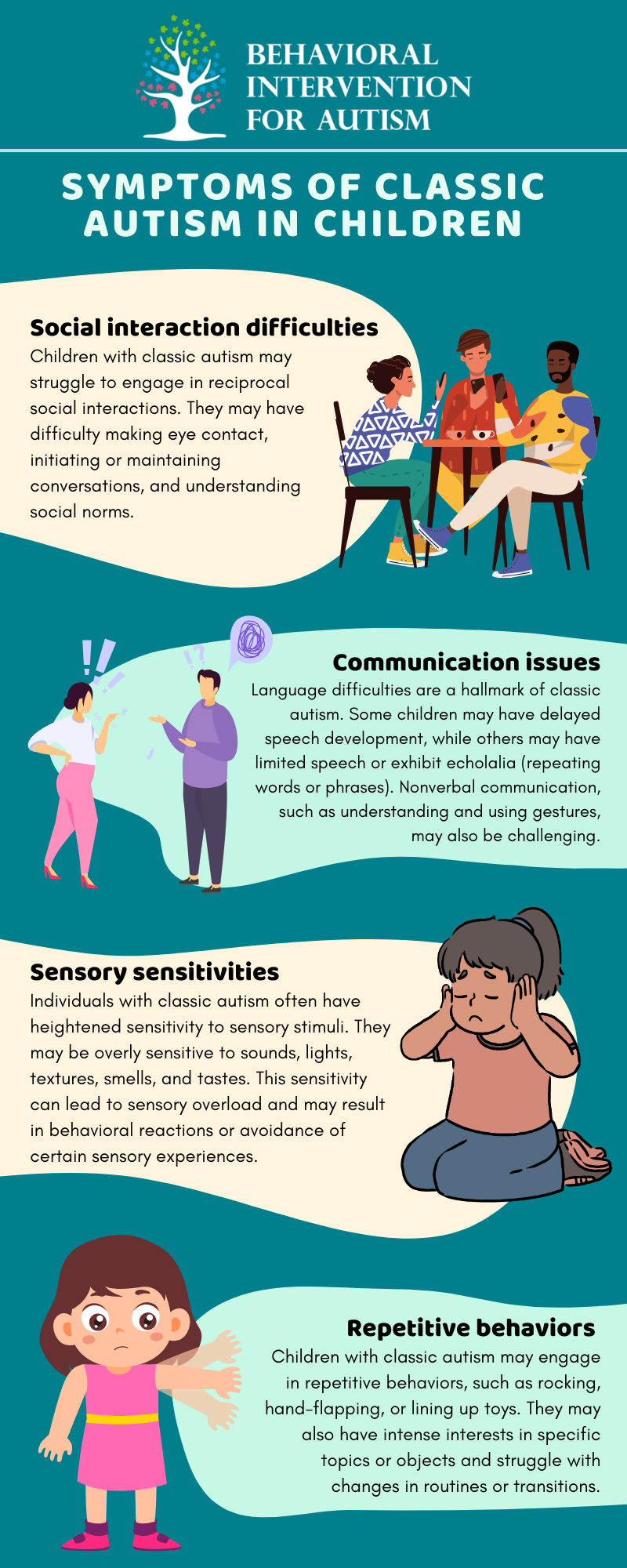Trick Symptoms And Signs to Acknowledge in People With Behavior Autism
When you come across somebody with behavior autism, acknowledging crucial symptoms and signs is crucial. You could see obstacles in social communications and communication, as well as a strong demand for regimens. Additionally, sensory sensitivities can result in frustrating experiences. Recognizing these characteristics can improve your support and treatments, however there's even more to discover concerning how these actions materialize in daily situations. Allow's discover what these signs really resemble.
Difficulties in Social Interactions
When you interact with someone on the autism range, you may see they deal with social cues and interaction. These difficulties can make social communications really feel frustrating for them. You might see them preventing eye contact or standing too close or also away during discussions, which can create misunderstandings. They could not pick up on body movement or faces, making it harder for them to gauge exactly how others are really feeling.
When they do involve, they might speak concerning their passions in wonderful detail without observing if you're interested. Recognizing these challenges can help you come close to communications with empathy and persistence, cultivating a much more comfy setting for both of you.
Problem With Verbal and Non-Verbal Communication

Acknowledging these signs is essential, as it assists you far better assistance and involve with individuals on the autism range. By recognizing their communication challenges, you can cultivate more significant links and provide a more encouraging setting.
Repetitive Actions and Regimens
Interaction challenges typically come with various other signs of autism, such as repeated habits and a solid choice for regimens. You might see that people with autism usually involve in certain, repetitive activities, like hand-flapping, rocking, or repeating phrases. These actions can provide comfort and a sense of control in an usually overwhelming globe.
When they adhere to an organized routine,Regimens are just as important; many individuals thrive. You might find that changes to these routines can cause substantial distress. If they have a daily routine of consuming morning meal at a certain time or complying with a certain route to college, any kind of interruption can cause anxiety.
Identifying these patterns assists you comprehend their behavior and give assistance. By accommodating their requirement for routine and allowing recurring activities, you can develop an extra comfortable environment that reduces their difficulties.
Sensory Sensitivities

Typical Sensory Triggers
Sensory level of sensitivities can substantially impact day-to-day live for individuals with autism, as particular stimuli often set off overwhelming reactions. Common sensory triggers consist of loud sounds, bright lights, and strong scents. You might discover that abrupt audios, like alarms or sirens, trigger anxiety or distress. Fluorescent lights in shops can feel severe and uneasy. Structures can additionally play a significant role; rough materials or particular food textures might be excruciating for you. Additionally, crowded locations can overwhelm your senses, making it difficult to loosen up or focus. Recognizing these triggers can help you manage your setting much better. By being mindful of what influences you, you can take actions to decrease discomfort and improve your daily experiences.
Behavioral Reactions Described
Recognizing your behavior reactions to sensory level of sensitivities is crucial, as they frequently reveal how you connect with the globe. You might notice that specific noises, lights, or structures bewilder you, leading to anxiousness or discomfort. When encountered with these stimulations, you might withdraw, cover your ears, or perhaps react boldy. These actions aren't just traits; they're your means of handling overstimulation. You may also locate on your own seeking details sensory experiences, like deep stress or quiet settings, to assist ground yourself. Recognizing these patterns assists you understand your demands better and can lead exactly how you connect them to others. By acknowledging your sensory level of sensitivities, you can function towards developing an atmosphere that really feels much more comfortable and convenient for you.
Coping Techniques Overview
Acknowledging your sensory level of sensitivities is just the primary step; currently it's time to explore coping techniques that can assist you take care of those experiences successfully. Beginning by developing a sensory toolkit tailored to your needs. This might consist of noise-canceling earphones, fidget playthings, or relaxing aromas. Establishing an organized regimen can likewise give predictability, decreasing anxiousness around sensory overload. Take breaks in a silent area to regroup when you feel overloaded. Practicing mindfulness techniques such as deep breathing can help ground you in the moment. Furthermore, communicate your requirements with those around you; having encouraging family and friends can make a substantial distinction. Bear in mind, locating what works ideal for you might take some time, so be open and patient to trying brand-new methods.
Limited Rate Of Interests and Emphasis
While many people establish a large range of rate of interests, those with autism commonly demonstrate restricted passions and an intense concentrate on certain subjects. You might reference see that someone with autism can invest hours delving into their favored topic, whether it's a particular kind of train, a details flick, or a scientific concept. This extreme focus isn't simply visit the website a leisure activity; it can become a main part of their identification and social interactions.
You might find that discussions rotate around these rate of interests, and they may have a hard time to engage in more comprehensive subjects. By comprehending and recognizing these limited interests, you can promote a supportive environment where they feel valued and comprehended, permitting for more significant connections and interactions.
Psychological Policy Problems
Individuals with autism frequently deal with obstacles in psychological policy, which can be affected by their extreme emphasis on certain passions. You could observe that when a person is deeply participated in a preferred task, they can experience solid feelings, whether exhilaration or stress. This strength occasionally makes it difficult for them to shift gears or manage their sensations when points don't go as intended.

Irregularity in Developing Milestones
When it comes to developmental milestones, you'll discover that individuals with autism commonly reveal a wide array of irregularity. You might see a kid stand out in language skills but struggle with social communications.
It's vital to identify that each person's trip is one-of-a-kind. Some might establish intricate abilities early, only to face challenges later. Others might take longer to attain basic milestones but after that prosper in details areas. Observing these patterns can aid you comprehend their staminas and needs better.
Frequently Asked Inquiries
Exactly How Is Autism Identified in Children and Grownups?
To identify autism in children and grownups, specialists review behavior, interaction skills, and social communications. They usually make use of standardized examinations, meetings, and monitorings to establish if an individual meets the standards for autism spectrum condition.
Exist Different Kinds Of Autism Range Disorders?
Yes, there are different sorts of autism spectrum problems, including Asperger's disorder and prevalent developmental disorder-not or else defined. Each kind varies in intensity and characteristics, so recognizing these distinctions can aid you far better support people with autism.
What Treatments Work for Individuals With Autism?
When thinking about efficient treatments for people with autism, you'll locate options like Applied Actions Evaluation, speech treatment, and job-related treatment. Each strategy can assist improve communication, social skills, and everyday operating customized to specific requirements.
Can Individuals With Autism Lead Independent Lives?
Yes, people with autism can lead independent lives. With the right assistance, skills training, and sources, you can assist them establish self-sufficiency, manage day-to-day jobs, and flourish in various environments, promoting their self-reliance.
Just How Can Families Assistance Loved Ones With Autism?
You can sustain your enjoyed ones with autism by creating a structured atmosphere, motivating their passions, practicing patience, cultivating communication, and advertising social skills. Celebrate their success, no issue how little, and develop a supportive area.
Although numerous people on the autism range can make use of and understand language, they often face substantial difficulties with both non-verbal and verbal interaction. Recognizing these indicators is important, as it aids you better support and involve with read here people on the autism spectrum. You could see that people with autism typically involve in particular, repeated actions, like hand-flapping, shaking, or duplicating expressions.Sensory level of sensitivities can significantly impact daily life for individuals with autism, as particular stimuli usually trigger overwhelming responses.When it comes to developmental landmarks, you'll see that people with autism usually reveal a large variety of irregularity.